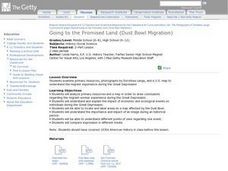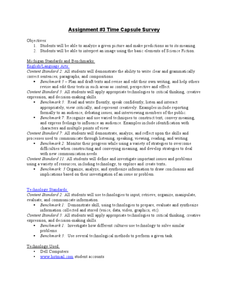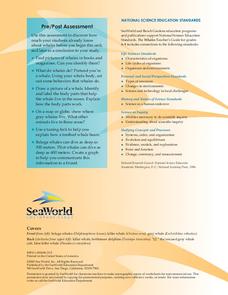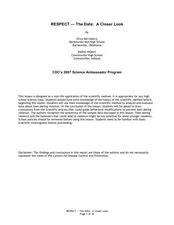Curated OER
Going to the Promised Land
Young scholars analyze primary resources and map in order to draw conclusions regarding the migrant-worker experience during the Great Depression. They explain and explain the impact of economic and ecological events on individuals.
Curated OER
Observing and Identifying Matter
In this observing and identifying matter worksheet, students use a cookie in a bag and list 10 different descriptions of the cookie. They draw and label their cookie and given the cookie in the bag to their teacher who mixes all the...
Curated OER
Acidity of Soda Pop
Students conduct an experiment to determine the acidity of three different brands of soda by adding a known volume of base until a pink color appears in the reaction vessel. They test fresh and flat soda, observe any differences, and...
Curated OER
Animals and Habitats of the Chesapeake Bay
Students work in small groups to discover the various habitats present in Chesapeake Bay and the animals that live in them. After investigating the habits and lives of the animals they will draw conclusions about other habitats the...
Curated OER
Water Anaysis
Students conduct three tests of water quality that can be utilized with TerrAqua columns and outdoors: pH, dissolved oxygen, and temperature. They make comparisons between different types of water and draw conclusions about how healthy...
Curated OER
Rainforest Data
In this geography worksheet, learners use the climate data given to create a temperature line graph and rainfall bar graph for each of three locations given. Then they use an atlas to compare their graphs and draw conclusions about the...
Curated OER
Momentum
Students explore the concept of momentum. In this physics lesson, students observe and compare two "carts" being released to move in various situations, and draw conclusions as to why the carts moved or didn't move.
Curated OER
Momentum Conserved
Students explore Newton's Laws of Motion and how momentum is conserved. In this physics lesson, students observe experiments in which various items collide. Students draw conclusions as to how "momentum" defined as "mass X velocity"...
Curated OER
Action and Reaction
Students experiment with Newton's Third Law of Motion. In this physics and motion lesson, students complete two experiments to illustrate force and its equal and opposite reaction. Students first work in pairs to exert an equal force on...
Curated OER
What factors affect the oxidation of apples?
Students investigate why an apple turns brown after being cut open and brainstorm why this occurs. For this oxidation lesson students design and conduct a simple experiment, analyze their results and draw conclusions.
Curated OER
Discovering Dinosaurs
Students discuss that scientists have theories about what dinosaurs were like but are unsure because they are no longer living. For this dinosaur research lesson, students examine how scientists use evidence to determine the behavior...
Curated OER
Oil and Energy Consumption
Students analyze the oil consumption and production information. In this investigative lesson students take the data collected, graph and organize it then draw conclusions about the use of oil worldwide.
Curated OER
Time Capsule Survey
Here's a fun way to incorporate technology into your curriculum. E-mail each of your class members a picture and 10 questions about the photo. Individuals then imagine the story behind the image and e-mail back their responses. Although...
Cornell Lab of Ornithology
Investigating Evidence
Explore the scientific process through nature. Scholars become scientists as they develop a question, design an experiment, collect data, and analyze their results. A two-week lesson guides your classes through the process and provides...
Science & Plants for Schools
Photosynthesis - A Survival Guide
Young scientists learn what it takes for life on Earth to survive with this series of photosynthesis resources. Offering twelve different activities ranging from independent practice worksheets to in depth scientific experiments, this...
School District of Palm Beach County
Framed Paragraphs characterization, problem and solution, symbolism, conflict
Support your learners as they work on writing paragraphs by providing graphic organizers, outlines, and frames. Sift through this packet to find the perfect organizers and templates to prepare pupils for writing. The resource...
PBS
Predicting/Making a Hypothesis
As an introduction to the hypothesis and testing method of investigation, young history detectives engage in a special investigation of a family artifact. After watching a short video that demonstrates the method, they develop a...
Rural Science Education Program
Bees and Flowers – Partners in Pollination
Why are bees so important? After several activities where kids investigate the form and function of flowers, they learn about the different types of bees and label them. They then examine pollen under a microscope and decide which bees...
Sea World
Whales
A whale of a lesson is sure to intrigue your elementary oceanographers! Learn about the mammals of the sea with a series of activities about whales, dolphins, and porpoises. Kids complete worksheets about the anatomy of a whale, create a...
WolfQuest
The Return of Gray Wolves to Yellowstone National Park: Right or Wrong?
Should gray wolves be removed from Yellowstone National Park? After researching the complex relationships between the various habitats and species at Yellowstone National Park, including humans, class members take a position on the...
California Education Partners
Science Fair Project
Plant the data firmly on the graph. Given information about the growth rate of plants, pupils determine the heights at specific times and graph the data. Using the information, scholars determine whether a statement is true and support...
American Chemical Society
Flame Out
Add a little heat to your science lesson. Young experimenters work to understand the chemical reaction taking place when a candle burns. They experiment with both oxygen and carbon dioxide to make conclusions about the reaction.
Curated OER
Respect--The Data: A Closer Look
Students explore the steps in the scientific method process. In this science lesson, students identify warning signs that someone is in an abusive dating relationship. They evaluate the credibility of information sources.
Curated OER
How Oceans Affect Climate
Learners draw conclusions about how the ocean affects temperature. In this weather lesson, students use the Internet to gather data to help them come to a conclusion about how the climate in a certain region is directly affected by the...

























